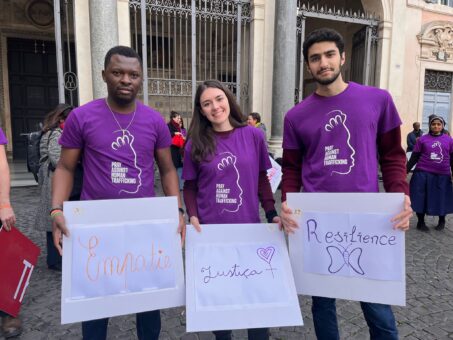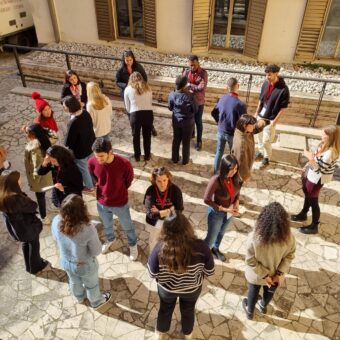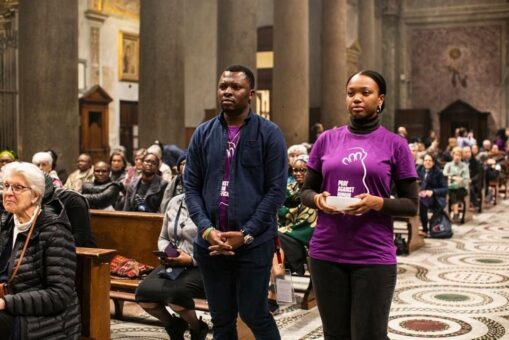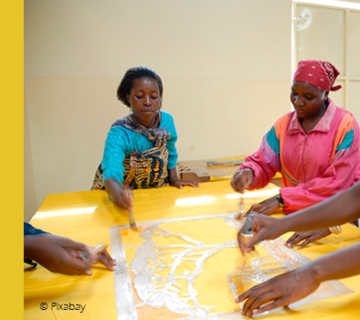From February 2 to 8, 2024, a week of mobilization and prayer against human trafficking. In Rome (Italy) the meeting of 50 young people from all continents including some boys and girls of the Focolare Movement.
Human trafficking is the process by which people are coerced or lured by false prospects, recruited, relocated and forced to work and live in exploitative or abusive conditions. It is a phenomenon, as the recent United Nations Reports warn, that is constantly and dramatically evolving. .
 From Feb. 2-8, 2024, the Week of Prayer Against Human Trafficking took place. Established by Pope Francis in 2015, the week always includes Feb. 8, the feast of St. Bakhita, a Sudanese nun who as a young girl was enslaved, sold and abused, was a victim of trafficking and a universal symbol of the fight against this scourge of humanity. This year’s theme was Walking for Dignity. Listening, Dreaming and Acting.
From Feb. 2-8, 2024, the Week of Prayer Against Human Trafficking took place. Established by Pope Francis in 2015, the week always includes Feb. 8, the feast of St. Bakhita, a Sudanese nun who as a young girl was enslaved, sold and abused, was a victim of trafficking and a universal symbol of the fight against this scourge of humanity. This year’s theme was Walking for Dignity. Listening, Dreaming and Acting.
Thousands of people around the world gathered to reflect, pray and share their experience of engaging against this global phenomenon.
In Rome, Italy, many young people from different countries-Kenya, Japan, the United States, Thailand, Albania, Canada, Mexico, France and Italy-participated in conferences, flash mobs, moments of prayer on the theme, the Angelus and the audience with Pope Francis held during the week. Among them were also some Gen2, young people of the Focolare Movement.
Prisque Dipinda, from the Democratic Republic of Congo recounts, “The most significant event for me was the vigil of prayer in the Church of Santa Maria in Trastevere, in the heart of Rome. It was an important moment before  God, the emotion in sharing it together with other young people who carry the challenge of human trafficking in their hearts. But also a responsibility to be part of the protagonists against this phenomenon. I think for the young people who attended it also served to become aware that so many in the world suffer, for various reasons: economic, political, religious. It was an opportunity to reflect and start together to design something against suffering.”
God, the emotion in sharing it together with other young people who carry the challenge of human trafficking in their hearts. But also a responsibility to be part of the protagonists against this phenomenon. I think for the young people who attended it also served to become aware that so many in the world suffer, for various reasons: economic, political, religious. It was an opportunity to reflect and start together to design something against suffering.”
Among the Gen2s present were Michel Haroun, a French-Lebanese and Miriana Dante, an Italian.
“I have never had a particular commitment against human trafficking,” says Michel. “I have some experience in serving migrants who arrive in my city or at the borders between states. For example, a few years ago I was in Trieste (Italy), the arrival point of the Balkan route through which migrants from so many parts of the world devastated by conflict arrive in Italy. But I was not sufficiently aware of the fact that refugees, before arriving in Europe-but it is also valid for Latin America, the United States or other parts of the world-suffer violence and abuse in an organized manner.
 These days lived in Rome together with other young people from different continents, languages, cultures, belonging to various Christian churches, were a rich experience of personal relationships that I hope will last, because eventually we will face (though we are already facing) the world together, as part of the same generation.”
These days lived in Rome together with other young people from different continents, languages, cultures, belonging to various Christian churches, were a rich experience of personal relationships that I hope will last, because eventually we will face (though we are already facing) the world together, as part of the same generation.”
“I was emotional getting to know the story of St. Bakhita,” said Miriana, “She had been a slave, she was sold. She later faced with courage all that she had experienced in the past, launching messages against human trafficking. I wondered where she got all that strength from. It did me a lot of good to have met so many of my peers who are committed to these issues. Not adults with long experience behind them, but young people my own age from all over the world who have dreams and hopes for a better future. We did not feel the cultural difference, because we were bound together by the unity among us through our common goal: to fight against human trafficking.”
Lorenzo Russo


 Italiano
Italiano Español
Español Français
Français Português
Português




No comment